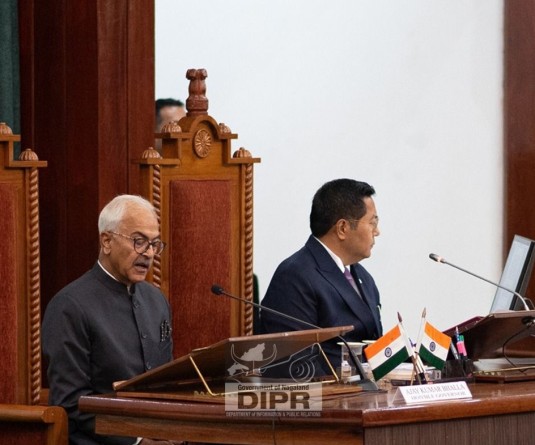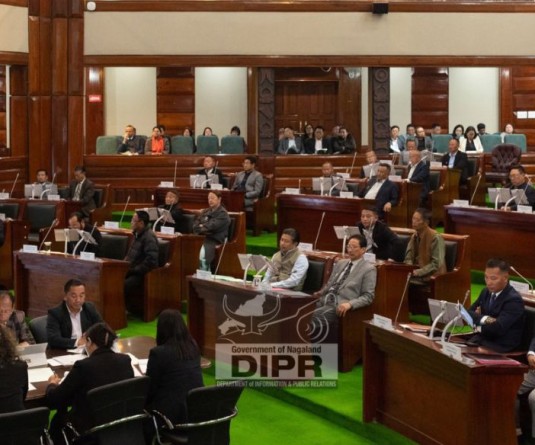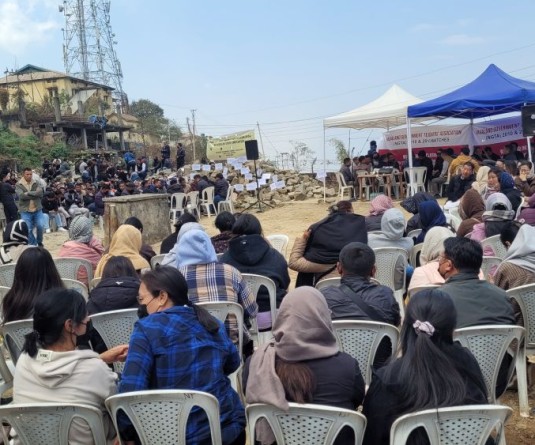
Vishü Rita Krocha
Morung Express News
Zhavame, one of the last villages under Phek district bordering Manipur state, is also one of the few villages in Nagaland that is home to a number of people who still hold on to their ancestral faith.
There are approximately 19 households in the village, (numbering about 30 people), who have not converted to Christianity, and still believe in their traditional or ancestral religion.
They are however, a fading generation. All their children have converted to Christianity, making them the last to hold on to their faith.
With the ancestral religion transcended by a ‘new faith,’ Athe, one of the last remaining believers in ancestral religion, underscore the importance of one’s ancestral belief, which she points out to this Correspondent, has a lot to do with the preservation of culture and tradition.
“Many of the traditional rites and rituals will disappear after we are gone,” she states in a matter of fact manner, albeit with a wistful tone. “We even asked our children to join us but they have all refused and we cannot force them,” she adds.
“The traditional months that we use to adhere to is also crucial even in the practice of agriculture, she explains as one case in point, specifying the relationship of religion, which is linked to the agricultural cycles and other natural rhythms of the earth.
The performance of such rituals, now a dying practice and vanished from most of the Naga villages, was witnessed during a recent festival held in the village from July 30, 2016, which lasted for five days.
“Laoni” (also called Naoni) Festival is considered as one of the most prominent festivals by the Zhavame community at large, although with the advent of Christianity, the celebration of the festival has been confined in respective homes by feasting and with children setting up camps in different khels to mark the celebration.
For those who hold on to the old beliefs however, it means a series of rituals to be meticulously performed during the period of the festival as laid down by their ancestors. On the first day, they refrain from eating rice and stick to drinking only local brew with a pinch of salt.
Each year, the rituals are led by a couple (on rotation basis), and their adherence to it is believed to be crucial for the entire community. The second day (which is also the most important day of the festival) begins with the assigned couple offering the finest local brew wrapped in banana leaves to “the divine being.” This is followed by ‘Mila’ or traditional fire making, another crucial act, as the success in the fire making determines how early they can eat after a day of going without food.
hey are also forbidden to cook in their everyday fireplace, but a fresh traditional hearth is solely made for the ritual with three shapely stones to support an exclusive earthen pot. Once the fire is lit, each member borrows the fire from there and takes it to their respective homes to cook for the day.
A cow is also slaughtered at the house of the couple performing the rituals for the year and is equally divided amongst them. For the next three days, they feast only on beef and local brew and eat rice only on the fifth day, which also calls for more rituals, and subsequently sums up the celebration.
‘Naoni,’ which literally means ‘completely exhausted after working in the fields for so long,’ is a celebration to relax and rest, after all the hard work invested in their agricultural activities. In the olden days, the festival was celebrated with much fervor and gaiety comprising of different khels singing, drinking, feasting, and wearing new attires.
Regardless of their group being small in number, they have so far managed to remain uninfluenced by Christianity, and continue to diligently practice the rituals of this ancestral religion.
“We perform rituals in everything- be it birth, death, sickness or agriculture,” Athe points out, indicating how rituals are an integral element of their religion.
As their population diminishes with old age catching up on them- and- with no new members willing to join the dying faith, Athe is worried.
“Who is going to perform the last rites for the last member to die here,” she poignantly questions.






